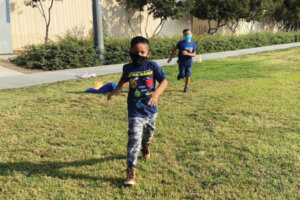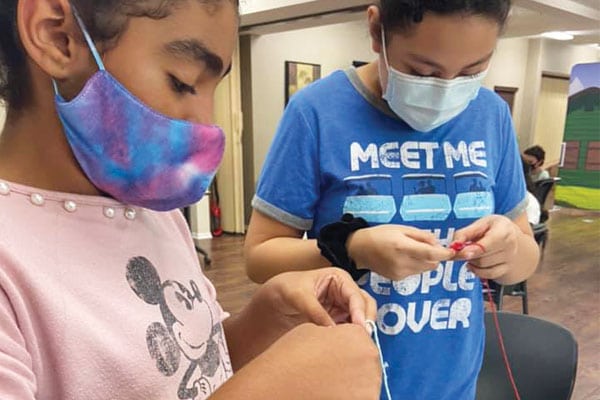The Value of Social Interaction for Young Children
By: Dorain Cassell, Executive Director, Child & Youth Development,
Certified CLASS observer and OCSTEM Cohort member
During the pandemic, a lot of things have stopped, but the development of young children has not. It is a trying season for adults, but for our young children, it is equally difficult because of the sudden shift in how we interact socially as a society—in our schools, in our workplaces, in our grocery stores, and even in our own homes.
As we continue to navigate the protocols during the COVID-19 pandemic—covering our faces with masks and shields—this will be challenging and chaotic for a child, especially if they are still early on in language development. Potential short-term impacts may be anything from delays in social and emotional development, to delays in coping and problem-solving skills, or lack of trust or fear of working with others. To see how teamwork, confidence, empathy, and a sense of belonging, just to name a few, show up in these children as adults remain to be seen. Only time will tell.
But what we do know is that the developmental foundations for a child’s well-being and development are set in the early years.
A child learns a lot from who and what they are able to see and observe around them, and this is how they develop “norms.” Reciprocal learning is part of this equation too when the roles of teacher and student change. An example here is when two children come together to give each other a spelling test. As one child coaches and gives the test, the other remains in their student role, and then they swap. These skills of observation and modeling behavior are big components of the educational system and can have a huge impact on how a child learns. Additionally, when children socially engage with other children their own age in this way, they begin to develop a sense of working with others, cooperation, and sharing.
Conflict resolution is another area that comes to mind when speaking on development. I have seen two children who often want the same toy. They begin to interact aggressively and eventually one child is hurt and begins to cry. This is where a teacher enters and begins the process of supporting the development of empathy and exemplifying how aggression towards another can be scary and cause pain. When a teacher can break down those actions into bite-sized pieces using language that both children understand, the two children can begin to understand that they have a choice in how they react.
Studies by childhood professionals have always shown us that parallel play is critical to the development of a child. This means to sit side- by-side and simply play. To sit and watch others, in a safe environment, provides the child with a sense of security and an opportunity to express themselves. Children begin to read and notice social cues from as early as birth, through child-directed speech, otherwise known as, “motherese” or “baby-talk.” This begins the process of developing language and communication skills. As children continue to grow and to develop a sense of self, they begin to define themselves as individuals through self-expression, and much of that development can be attributed to their social interactions with others, especially with children of the same age. Along with this comes the understanding of facial expressions, and social cues, as children gauge success or failures based on the reaction of another person.
by-side and simply play. To sit and watch others, in a safe environment, provides the child with a sense of security and an opportunity to express themselves. Children begin to read and notice social cues from as early as birth, through child-directed speech, otherwise known as, “motherese” or “baby-talk.” This begins the process of developing language and communication skills. As children continue to grow and to develop a sense of self, they begin to define themselves as individuals through self-expression, and much of that development can be attributed to their social interactions with others, especially with children of the same age. Along with this comes the understanding of facial expressions, and social cues, as children gauge success or failures based on the reaction of another person.
So, what can parents do to support their child’s social skills in this unusual time? Here are three simple tips as we adjust to the “new normal” of 2020:
- Educate yourself. One of the biggest ways a parent can support their child is to become aware of what socialization looks like and how vital it is to the overall development of your child. We have a world of knowledge readily available, so take advantage of all of the resources at your fingertips to educate yourself as a parent or caregiver. A few resources include:
https://www.cde.ca.gov/sp/cd/re/parentresources.asp
https://www.naeyc.org/ - Model it. Healthy interactions with your children are key! When children get to see what cooperation, sharing and teamwork looks like firsthand at home, they are able to make connections with their own friends and model that same behavior.
- Be consistent. One of the greatest and most reliable ways to expose your child to more social settings is to take advantage of the childcare opportunities within your own community. Whether you are looking for small groups like a club or sport, the YMCA of Orange County offers individual, small, and large group opportunities for your child to engage with their peers and socially interact in a healthy and safe environment. Self-expression is supported, as children are encouraged to, “use words,” conflict resolution is supported through developing empathy and “seeing the other person’s side,” and teamwork is supported by working together, sharing, and taking turns.
These are just a few small ways in which the YMCA and other social programs help to support the development of young children. Although these ideas may seem very simple, they are the foundational building blocks to developing a strong sense of moral character and cultural values within our community.


